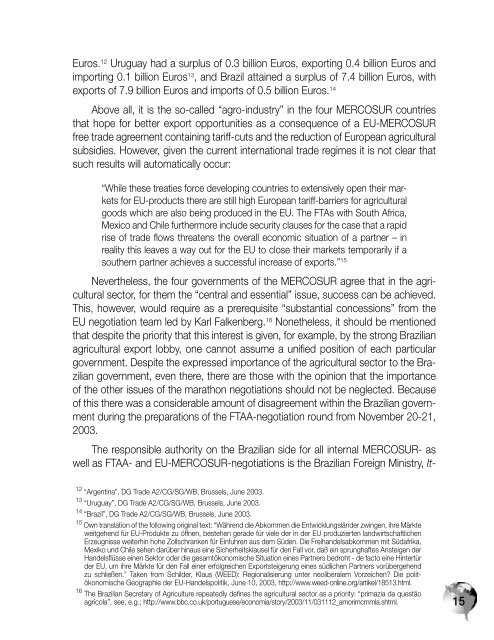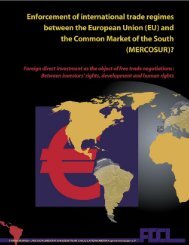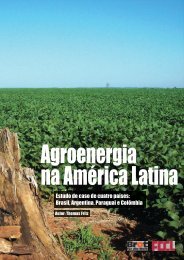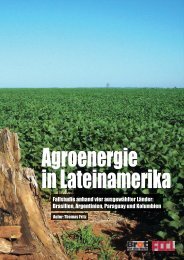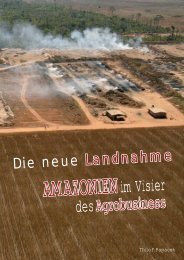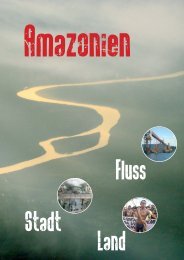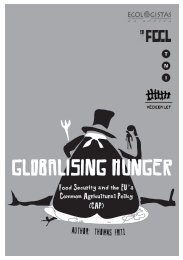(EU) and the Common Market of the South (MERCOSUR)? - FDCL
(EU) and the Common Market of the South (MERCOSUR)? - FDCL
(EU) and the Common Market of the South (MERCOSUR)? - FDCL
Create successful ePaper yourself
Turn your PDF publications into a flip-book with our unique Google optimized e-Paper software.
Euros. 12 Uruguay had a surplus <strong>of</strong> 0.3 billion Euros, exporting 0.4 billion Euros <strong>and</strong><br />
importing 0.1 billion Euros 13 , <strong>and</strong> Brazil attained a surplus <strong>of</strong> 7.4 billion Euros, with<br />
exports <strong>of</strong> 7.9 billion Euros <strong>and</strong> imports <strong>of</strong> 0.5 billion Euros. 14<br />
Above all, it is <strong>the</strong> so-called “agro-industry” in <strong>the</strong> four <strong>MERCOSUR</strong> countries<br />
that hope for better export opportunities as a consequence <strong>of</strong> a <strong>EU</strong>-<strong>MERCOSUR</strong><br />
free trade agreement containing tariff-cuts <strong>and</strong> <strong>the</strong> reduction <strong>of</strong> European agricultural<br />
subsidies. However, given <strong>the</strong> current international trade regimes it is not clear that<br />
such results will automatically occur:<br />
“While <strong>the</strong>se treaties force developing countries to extensively open <strong>the</strong>ir markets<br />
for <strong>EU</strong>-products <strong>the</strong>re are still high European tariff-barriers for agricultural<br />
goods which are also being produced in <strong>the</strong> <strong>EU</strong>. The FTAs with <strong>South</strong> Africa,<br />
Mexico <strong>and</strong> Chile fur<strong>the</strong>rmore include security clauses for <strong>the</strong> case that a rapid<br />
rise <strong>of</strong> trade flows threatens <strong>the</strong> overall economic situation <strong>of</strong> a partner – in<br />
reality this leaves a way out for <strong>the</strong> <strong>EU</strong> to close <strong>the</strong>ir markets temporarily if a<br />
sou<strong>the</strong>rn partner achieves a successful increase <strong>of</strong> exports.” 15<br />
Never<strong>the</strong>less, <strong>the</strong> four governments <strong>of</strong> <strong>the</strong> <strong>MERCOSUR</strong> agree that in <strong>the</strong> agricultural<br />
sector, for <strong>the</strong>m <strong>the</strong> “central <strong>and</strong> essential” issue, success can be achieved.<br />
This, however, would require as a prerequisite “substantial concessions” from <strong>the</strong><br />
<strong>EU</strong> negotiation team led by Karl Falkenberg. 16 None<strong>the</strong>less, it should be mentioned<br />
that despite <strong>the</strong> priority that this interest is given, for example, by <strong>the</strong> strong Brazilian<br />
agricultural export lobby, one cannot assume a unified position <strong>of</strong> each particular<br />
government. Despite <strong>the</strong> expressed importance <strong>of</strong> <strong>the</strong> agricultural sector to <strong>the</strong> Brazilian<br />
government, even <strong>the</strong>re, <strong>the</strong>re are those with <strong>the</strong> opinion that <strong>the</strong> importance<br />
<strong>of</strong> <strong>the</strong> o<strong>the</strong>r issues <strong>of</strong> <strong>the</strong> marathon negotiations should not be neglected. Because<br />
<strong>of</strong> this <strong>the</strong>re was a considerable amount <strong>of</strong> disagreement within <strong>the</strong> Brazilian government<br />
during <strong>the</strong> preparations <strong>of</strong> <strong>the</strong> FTAA-negotiation round from November 20-21,<br />
2003.<br />
The responsible authority on <strong>the</strong> Brazilian side for all internal <strong>MERCOSUR</strong>- as<br />
well as FTAA- <strong>and</strong> <strong>EU</strong>-<strong>MERCOSUR</strong>-negotiations is <strong>the</strong> Brazilian Foreign Ministry, It-<br />
12<br />
“Argentina”, DG Trade A2/CG/SG/WB, Brussels, June 2003.<br />
13<br />
“Uruguay”, DG Trade A2/CG/SG/WB, Brussels, June 2003.<br />
14<br />
“Brazil”, DG Trade A2/CG/SG/WB, Brussels, June 2003.<br />
15<br />
Own translation <strong>of</strong> <strong>the</strong> following original text: “Während die Abkommen die Entwicklungsländer zwingen, ihre Märkte<br />
weitgehend für <strong>EU</strong>-Produkte zu öffnen, bestehen gerade für viele der in der <strong>EU</strong> produzierten l<strong>and</strong>wirtschaftlichen<br />
Erzeugnisse weiterhin hohe Zollschranken für Einfuhren aus dem Süden. Die Freih<strong>and</strong>elsabkommen mit Südafrika,<br />
Mexiko und Chile sehen darüber hinaus eine Sicherheitsklausel für den Fall vor, daß ein sprunghaftes Ansteigen der<br />
H<strong>and</strong>elsflüsse einen Sektor oder die gesamtökonomische Situation eines Partners bedroht - de facto eine Hintertür<br />
der <strong>EU</strong>, um ihre Märkte für den Fall einer erfolgreichen Exportsteigerung eines südlichen Partners vorübergehend<br />
zu schließen.” Taken from Schilder, Klaus (WEED): Regionalisierung unter neoliberalem Vorzeichen? Die politökonomische<br />
Geographie der <strong>EU</strong>-H<strong>and</strong>elspolitik, June 10, 2003, http://www.weed-online.org/artikel/18513.html.<br />
16<br />
The Brazilian Secretary <strong>of</strong> Agriculture repeatedly defines <strong>the</strong> agricultural sector as a priority: “primazia da questão<br />
agrícola”, see, e.g.; http://www.bbc.co.uk/portuguese/economia/story/2003/11/031112_amorimcmmla.shtml.<br />
15


